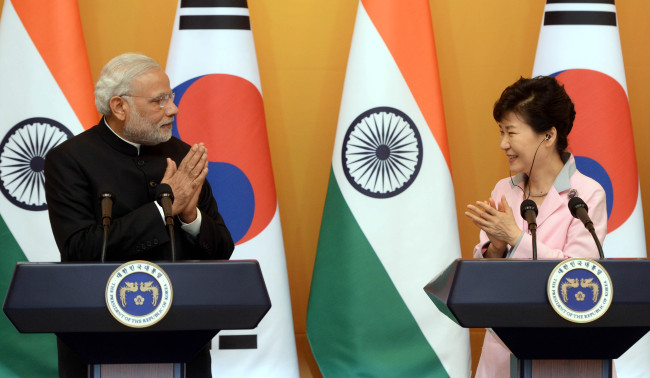South Korean President Park Geun-hye and her Indian counterpart Narendra Modi on Monday agreed to elevate the level of bilateral ties to a “special strategic partnership” and start negotiations to revise a comprehensive economic partnership agreement, which is equivalent to a free trade deal, by June next year.
At a summit held at Cheong Wa Dae, the leaders discussed ways to bolster cooperation in a wide range of fields, including diplomacy, security, economics, culture and science technology, to take the bilateral ties to a “qualitatively” higher level.
“Prime Minister Modi and I have agreed to upgrade the bilateral relationship to a ‘special strategic partnership’ today five years after the two countries established CEPA, to promote a wider range of cooperation with India, one of the fast-emerging countries in the world,” said Park at a joint press conference after the summit.
The leaders agreed to hold a bilateral summit every year, as well as a separate meeting between foreign ministers, to strengthen communication channels.
At a summit held at Cheong Wa Dae, the leaders discussed ways to bolster cooperation in a wide range of fields, including diplomacy, security, economics, culture and science technology, to take the bilateral ties to a “qualitatively” higher level.
“Prime Minister Modi and I have agreed to upgrade the bilateral relationship to a ‘special strategic partnership’ today five years after the two countries established CEPA, to promote a wider range of cooperation with India, one of the fast-emerging countries in the world,” said Park at a joint press conference after the summit.
The leaders agreed to hold a bilateral summit every year, as well as a separate meeting between foreign ministers, to strengthen communication channels.

After the summit, the two also observed the signing of the revised double taxation avoidance agreement and the memorandum of understanding on boosting bilateral cooperation on steel, shipbuilding and maritime transport industries. The South Korean government also expressed its intention to provide $10 billion for mutual cooperation in infrastructure and export credits for smart cities, railways, power generation and transmission projects in India, according to a joint statement issued after the summit.
The two sides also agreed to boost cooperation in the aerospace sector by promoting ties between the Indian Space Research Organization and the Korea Aerospace Research Institute.
On security front, the leaders expressed concern over Pyongyang’s development of nuclear weapons and ballistic missile programs, stating that such moves are in violation of its international obligation and commitments.
They also reiterated their commitment to eradicate terrorism for world peace and stability. On culture, the two sides agreed to jointly produce film and TV content and promote human exchanges to better understanding each other.
The Indian premier arrived in Seoul on Monday for a two-day trip. South Korea is his last destination of a three-nation trip aimed at enhancing ties with India’s eastern neighbors. Before South Korea, Modi visited China and Mongolia.
During the summit, Modi requested the South Korean leader to provide investment and support for his “Make in India” drive ― aimed at bolstering India’s manufacturing sector ― and its participation in infrastructure projects including one to build “smart cities” across the world’s largest democracy.
The meeting is expected to offer an opportunity for South Korea to strengthen ties with India, dubbed as “Next China” due to its market size and also its diplomatic status.
The leaders were holding the summit for the second time after their previous meeting held on the sidelines of the East Asia Summit and ASEAN Plus Three Summit. At the meeting last year, they discussed ways to improve a strategic partnership signed in 2010.
Early last year, the two countries had agreed to elevate the level of CEPA, during Park’s official visit to India. But market insiders said that the level of free trade has remained too low for South Korean companies to enter one of the world’s fast-emerging markets.
The summit between Park and Modi was, however, expected to offer Korean businesses wider access to the world’s second-most populous market of 1.2 billion. India is South Korea’s 12th trading partner and is expected to become a crucial partner for its geopolitical importance.
Modi’s “Make in India” drive is likely to be highlighted during his meetings with Korean business leaders on Tuesday.
By Cho Chung-un (christory@heraldcorp.com)
-
Articles by Korea Herald




![[KH Explains] No more 'Michael' at Kakao Games](http://res.heraldm.com/phpwas/restmb_idxmake.php?idx=644&simg=/content/image/2024/04/28/20240428050183_0.jpg&u=20240428180321)













![[Herald Interview] Mistakes turn into blessings in street performance, director says](http://res.heraldm.com/phpwas/restmb_idxmake.php?idx=652&simg=/content/image/2024/04/28/20240428050150_0.jpg&u=20240428174656)
